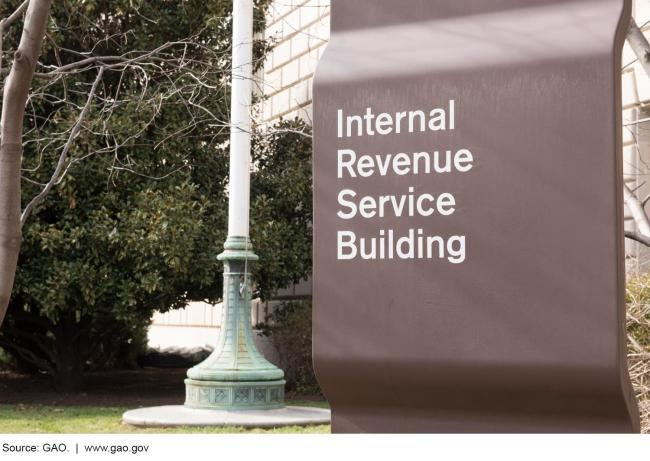Financial Audit: IRS's FY 2019 and FY 2018 Financial Statements
Fast Facts
In 2019, IRS collected over $3 trillion in taxes. This money equates to about 95% of the gross revenue of the United States and helps fund the country. Accordingly, IRS’s financial management is important to Congress and taxpayers.
We audit IRS's financial statements each year and issue an opinion on them, as well as on the effectiveness of the agency's internal controls (e.g., its ability to ensure that transactions are properly authorized and recorded).
We found that IRS’s financial statements were reliable and that its internal controls over financial reporting were effective in 2019.

The IRS
Highlights
What GAO Found
In GAO's opinion, the Internal Revenue Service's (IRS) fiscal years 2019 and 2018 financial statements are fairly presented in all material respects, and although controls could be improved, IRS maintained, in all material respects, effective internal control over financial reporting as of September 30, 2019. GAO's tests of IRS's compliance with selected provisions of applicable laws, regulations, contracts, and grant agreements detected no reportable instances of noncompliance in fiscal year 2019.
Limitations in the financial systems IRS uses to account for federal taxes receivable and other unpaid assessment balances, as well as other control deficiencies that led to errors in taxpayer accounts, continued to exist during fiscal year 2019.These control deficiencies affect IRS's ability to produce reliable financial statements without using significant compensating procedures. In addition, unresolved information system control deficiencies from prior audits, along with application and general control deficiencies that GAO identified in IRS's information systems in fiscal year 2019, placed IRS systems and financial and taxpayer data at risk of inappropriate and undetected use, modification, or disclosure.
IRS continues to take steps to improve internal controls in these areas. However, the remaining deficiencies are significant enough to merit the attention of those charged with governance of IRS and therefore represent continuing significant deficiencies in internal control over financial reporting related to (1) unpaid assessments and (2) financial reporting systems. Continued management attention is essential to fully addressing these significant deficiencies.
Why GAO Did This Study
In accordance with the authority conferred by the Chief Financial Officers Act of 1990, as amended, GAO annually audits IRS's financial statements to determine whether (1) the financial statements are fairly presented and (2) IRS management maintained effective internal control over financial reporting. GAO also tests IRS's compliance with selected provisions of applicable laws, regulations, contracts, and grant agreements.
IRS's tax collection activities are significant to overall federal receipts, and the effectiveness of its financial management is of substantial interest to Congress and the nation's taxpayers.
Recommendations
Based on prior financial statement audits, GAO made numerous recommendations to IRS to address internal control deficiencies. GAO will continue to monitor and will report separately on IRS's progress in implementing prior recommendations that remain open. Consistent with past practice, GAO will also be separately reporting on the new internal control deficiencies identified in this year's audit and providing IRS recommendations for corrective actions to address them.
In commenting on a draft of this report, IRS stated that it continues its efforts to improve its financial reporting systems controls and internal controls over unpaid assessments.
